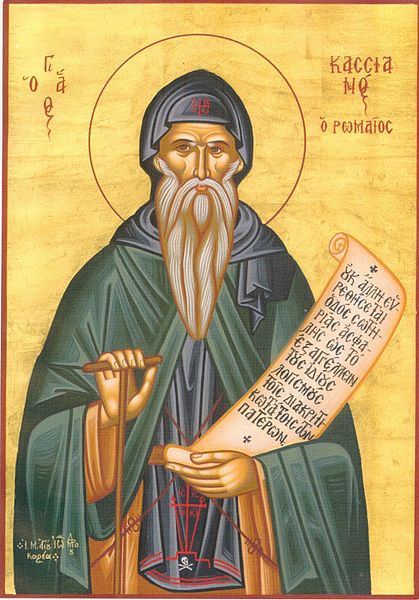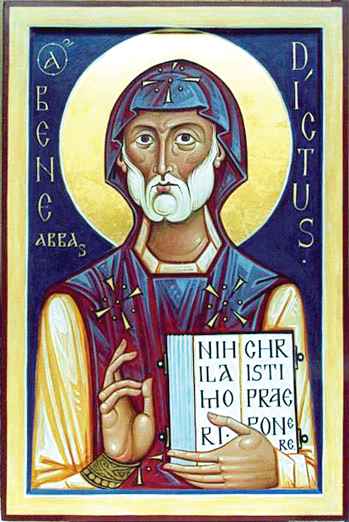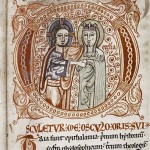David Russell Mosley

Date 31 January 2015
Source www.pravicon.com
Author Unknown
Ordinary Time
Feast of St. Benedict
The Edge of Elfland
Hudson, New Hampshire
Dear Readers,
As many of you will know today is the feast of St. Benedict, you know, the one from the Rule of St. Benedict, the one to whom people keep assigning an Option. But today, in this short post, I don’t want to write to you about the man, his Rule, or his Option. Rather, I want to write to you about one his sources, the rather unsung, in the West, John Cassian.
Cassian’s one of those authors about whom we seem to know a lot and not very much. For instance, we know he lived during the fifth century, was a contemporary of Augustine’s and Pelagius’. We know, probably, that he travelled around the Egyptian desert with his friend and fellow monk Germanus. From these travels, and Cassian’s own reflections, he penned The Conferences. It this

http://www.svetigora.com/node/976
collection of conversations that ultimately kept Cassian from becoming a saint in the West, an honor he does hold in the East. The problem is primarily with Conference 13 wherein Cassian deals with grace and free will. Prosper of Aquitaine, a hyper-Augustinian, was Cassian’s earliest detractor. Prosper understood Cassian to be teaching heresy and to be contradicting Augustine. What Augustine thought of Cassian, if anything, we’ll not know until we can ask him. What is clear, especially if on read’s Cassian’s On the Incarnation is that Cassian was ardently anti-Pelagian, seeing Nestorianism in a Pelagian light.
After Cassian’s time in the desert he returned (or perhaps went, depending on where he was from) to Gaul where he wrote his three extant works, The Institutes, The Conferences, and On the Incarnation. The Institutes is perhaps one of the earliest monastic rules, loosely speaking, in the West. In it Cassian lists out how monks ought to live together based on what he learned whilst with the Desert Fathers. Benedict recommends in the final chapter of his Rule, that the monks read The Institutes and The Conferences amongst other works so that they may progress in perfection:
But for those who would hasten to the perfection of that life
there are the teaching of the holy Fathers,
the observance of which leads to the height of perfection.
For what page or what utterance
of the divinely inspired books of the Old and New Testaments
is not a most unerring rule for human life?
Or what book of the holy Catholic Fathers
does not loudly proclaim
how we may come by a straight course to our Creator?
Then the Conferences and the Institutes
and the Lives of the Fathers,
as also the Rule of our holy Father Basil —
what else are they but tools of virtue
for right-living and obedient monks?
But for us who are lazy and ill-living and negligent
they are a source of shame and confusion (emphasis added).
Now as I’ve said, despite this ringing recommendation from St. Benedict, Cassian remains a rather ignored or maligned figure in Western Christianity (or at least in Roman Catholicism). Yet he clearly was an important figure for Benedict. Not only did Benedict incorporate much of The Institutes in his rule, but he recommends The Institutes and The Conferences as, if this be not reading too much into Benedict’s work, aids to the monk’s deification. So, with Benedict, I too, sinner though I am, recommend the works of John Cassian to you. Maybe someday I’ll write another letter dealing with the potential issues between Augustine, Cassian, and Pelagius. For now, I leave you with these words from Cassian himself:
Abba Theonas, ‘“Therefore, since nothing is stable of itself, nothing good but the Godhead alone, and every creature acquires the blessedness of eternity and immutability by arriving at it not through its own nature but through participation with the Creator and through his grace, they cannot maintain the dignity of goodness when compared with their Creator”’ (Conf. 23.III.4).
Sincerely,
David












